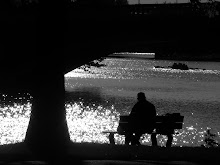Who likes group e-mail? I don't. Yet I get plenty of those every day. I can't help but thinking about e-mails meant for groups of people as being somewhere in the middle of the spectrum that goes from very personal messages to online newspapers. The closer and more interconnected the group that the e-mail is addressed to, the closer to the "personal message" side of the spectrum I consider it.
For months, actually for years now, I have been receiving group e-mails from somebody have never met in person. His name is Iván Vallejo, and he is a mountaineer -although he defines himself as an "expeditionary"-. These are emails that are, to my understanding, sent to a relatively large number of people. That is to say, these are the kind of e-mails that I would typically not read or read very briefly, and swiftly take them out of my Inbox. But today, when I received a message from him, I noticed I didn't delete it. Then I looked back at my saved files, and I noticed that apparently I have not deleted any of the many e-mails that I have received from his account...
The question that followed was: What does it mean? Does it say anything about me? Iván Vallejo is a well-known and well-respected person in our country, Ecuador. But I doubt that is the reason why I kept his correspondence - I do receive similar emails from other people with similar characteristics, and I tend to be pretty efficient in vanishing them from my archives. It was then that it clicked that there is something I deeply respect in him, something that I look up to, something that I feel inspired by...
A few years ago, he set a goal to himself: he was to climb the 14 tallest mountains in the world, all above 8 ,000 meters high, and all without oxygen. It was not an easy challenge. Not only did he have to find sponsors to be able to devote himself to this endeavor, but most importantly, he had to overcome thousands of small and huge obstacles along the way. He failed more than once, having to come back from mountains without reaching the top after weeks and even months of preparation, after being just so very close. The only think he had left in those occasions was to turn the page and to start over, not letting the disappointment stop him. And he did star over. Once, twice, as many times as needed. He documented in videos and in his online diary his personal struggles. Not afraid to show the weaknesses, the fears, the lack of air, the pains, the hopes, the frustration, and eventually, the happiness each time a mountain top was reached. And on May 1st. of 2008 he reached the top of the Dhaulagiri, in Nepal, fulfilling his goal.
What did he do next? Well, he set himself a new goal! The new project involves bringing along more people with him. "Somos Ecuador" gathers together group of Ecuadorian mountaineers in order to climb the big mountains of the world, and eventually climb the Himalayas. He proved he could do it on his own. Now he means to lead the way in order to prove that they can do it as a team. This just revealed very clearly what his greater goal is and has been since the beginning. The ultimate purpose of Vallejo's expeditions is to inspire and to mobilize others.
I find here one of the most beautiful metaphors of life, or better, of how to live life to its fullest, facing the challenges with optimism and purpose. It is not about not being fearful, it is about overcoming fear. It is not about the physical strength, it is about the strength of the mind and, above all, of the soul. It is about you as an individual, but just as long as you can also make it about your community, about inspiring and mobilizing other people to set and achieve their own and the shared goals. And this morning, as I discovered that I have not deleted any of the messages that I have received from Vallejo, I learned that these are amongst the values that I hold in greatest esteem, and that I really want to learn more and practice more of. Looking at the picture that I am posting here (which I borrowed from his website), taken from the top of Mont Blanc, I see both the beauty of this landscape as seen from the furthest point above, and the beauty of the path behind, the testimony of the struggle within each of the expeditionaries' hearts, and their success.
This is what I learned from Iván Vallejo about myself. I thank him for that, and wish all of the best to the "Somos Ecuador" team who are currently in Huaraz, Perú.


